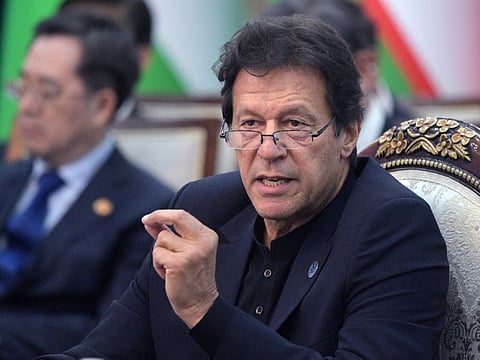Imran Khan’s reform must not target political opponents
Pakistan PM needs to educate his countrymen on how to avoid further economic ruin

The decision by Prime Minister Imran Khan’s government last week to establish a high powered national commission to probe how Pakistan became saddled with an unbearable national debt, deserves close scrutiny for more than one reason.
At the outset, it’s important to establish that a serious and detailed exercise to reconcile with Pakistan’s history must not be allowed to become politicised for the country’s ruling elite to throw mud on political opponents. Tragically far too often in the past, similar attempts aimed at clearing the baggage of history have eventually become nothing but a basis for political score-settling rather than a plank to avoid repeating past mistakes.
Since coming to power last year, Imran and his political loyalists have repeatedly claimed that almost 80 per cent of the country’s national debt was drawn just in the past decade. Specifically, the government of Pakistan Tehreek-e-Insaf (PTI), or Pakistan Justice Movement, political party led by Imran has held former prime minister Nawaz Sharif and former president Asif Ali Zardari principally responsible for Pakistan’s descent into economic chaos triggered by reckless borrowing under their watch.
It’s difficult to tell immediately if the allegations by Imran will hold true unless backed by detailed and independent research. Before Imran’s rise to political power as prime minister, the previous government of former prime minister Nawaz Sharif was routinely accused by many analysts of devoting large chunks of money to seemingly unproductive causes.
Areas involving wasteful expenditure must receive close attention in Pakistan’s national debate, with detailed recommendations on how best to avoid them in future.Farhan Bokhari
In a country where poverty-stricken people urgently need acceptable quality education, health care, basic housing and jobs to make their ends meet, Sharif zealously pursued fanciful projects like luxury urban bus networks or urban trains. Armed with a well-known enthusiasm for transport related endeavours, Sharif and his political cronies have faced widespread lament for long on their choices which were made in the name of national development.
Be it Sharif or before him the rule of Zardari, it would be hard to bring them to book on such matters irrespective of how recklessly they performed. The two came to office in widely recognised democratic processes where each led their parties to victory. And once in charge of the parliament, the policies adopted under their ruling structure, clearly carried legitimacy for they were adopted in the name of popularly elected ruling frameworks. This, however, does not mean that Imran is left without room for manoeuvre on debt related issues.
He must now dedicate himself to educating Pakistanis not only on mistakes of the past that caused the country’s economic ruin, but more importantly, to search for ways to avoid them in future. Areas involving wasteful expenditure must receive close attention in Pakistan’s national debate, with detailed recommendations on how best to avoid them in future.
Debt management
At the same time, this probe must also investigate if more affordable debt could have been taken to save on debt servicing. The business of debt worldwide involves large expenditures of money in addition to just the loans that are raised by countries or companies to keep themselves going. From lawyers’ fees for drawing up contracts to expensive bankers who draw huge salaries, the cost of the paraphernalia in this area does not come cheap. Alongside questions over lack of transparency surrounding conditions for debt, Pakistan needs to place its own house in order over questions related to management of its economy too.
Once again this year, a number of compelling questions continue to be raised over the national budget for the new financial year which begins next month. With Pakistan’s crucial agriculture sector clearly crashed and the country’s industries performing far below expectations, there is a pressing need to revisit the country’s model for managing its economy.
Also Read: Laying the course for Pakistan’s future
Also Read: Time to push through reforms in Pakistan
Yet across the political spectrum, notably among parties represented in parliament, there is clearly a paucity of voices involved in discussions on national economic policies. And the noises from opposition politicians heard in parliament this month following the budget, largely focused on the fate of key opposition leaders who are incarcerated on corruption related charges, than key areas of Pakistan’s economic outlook.
Taken together, the host of challenges surrounding Pakistan’s economy are such that their future will certainly set the pace for the future of the country itself. The timing of meeting this challenge could not have been more urgent. In less than two weeks, Pakistan’s request for a new loan from the International Monetary Fund (IMF) is due to be considered by the executive board of the Washington-based lender.
Imran’s elevation to office last year came with his clarion call announcing tabdeeli or change for the future of Pakistan. And yet even today, many of the country’s old ways of running national affairs remain intact. A change for the better will just begin when the notion of change begins to be put in place.
—Farhan Bokhari is a Pakistan-based commentator who writes on political and economic matters.



